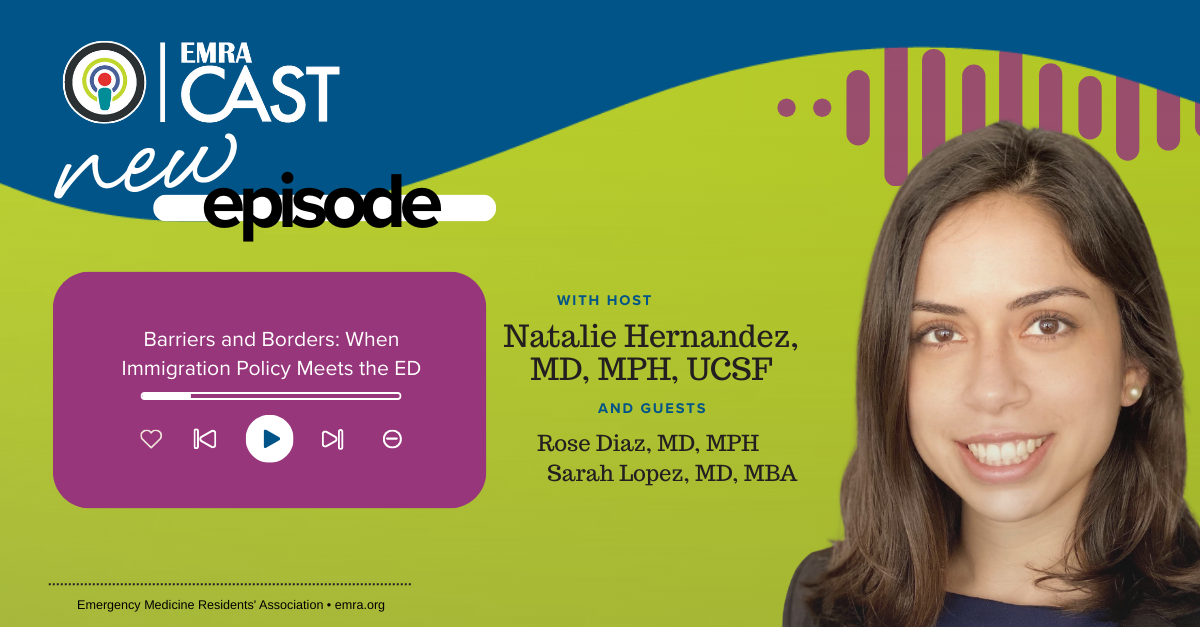Bridging Health and Humanity: Barriers and Borders
Barriers and Borders
Aug. 15, 2025
When immigrants come to the ER for care, do you know their rights? Do you know your own rights - and your responsibilities? In this episode of EMRA*Cast's "Bridging Health and Humanity" series, hosted by Dr. Natalie Hernandez, we explore the effects of current immigration policies and enforcement tactics on the health of vulnerable communities. The discussion features Dr. Rose Diaz and Dr. Sarah Lopez, both advocates for immigrant health.
Host
Natalie Hernandez, MD, MPH
UCSF Medical Education Fellow, 2025
Harbor-UCLA EM Residency Class of 2025
EMRA*Cast Episodes
OVERVIEW
In this episode of "Bridging Health and Humanity," hosted by Dr. Natalie Hernandez, the focus is on the effects of current immigration policies and enforcement tactics on the health of vulnerable communities. The discussion features Dr. Rose Diaz and Dr. Sarah Lopez, both advocates for immigrant health, who share their insights on changes in immigration policy, including the revocation of "sensitive location" protections and adjustments to the public charge rule.
They delve into the broader impact of these policies on patient trust and public health, including delayed care and increased health care costs. The segment also explores how health care teams can support immigrant communities through advocacy, education, and understanding legal protections.
The episode concludes with hopeful reflections and practical advice for medical professionals committed to supporting these marginalized populations.
Publisher's Note: Please be aware of EMRA's free resource, accessed within MobilEM or online, to help you respond when ICE officials enter the ED.
- Responding to ICE in Emergency Departments: Protecting Patients and Navigating Legal Obligations
- Free downloadable ICE management tips to post in your hospital
- Access this resource free within MobilEM, in the Conversation Toolkit
Special Update
Listen to the whole episode to get an update on Dr. Hernandez's earlier episode, "War Zone Emergency Medicine." Hear audio recordings from 2 emergency physicians, Dr. Aslam Akhtar and Dr. Ahmed Farhat, who describe the dire circumstances they face while serving with a medical mission in Gaza, coordinated by RAHMA Worldwide.
Barriers and Borders: Objectives
- Understand the impact of current U.S. immigration policies and enforcement tactics on immigrant health.
- Recognize the effects of the revocation of "sensitive location" protections on patient trust, safety, and access to emergency care.
- Explain the history, implications, and evolving nature of the Public Charge rule and Title 42 on health care utilization by immigrant communities.
- Identify and dispel common myths regarding undocumented immigrants and health care settings (e.g., arrest risks, HIPAA obligations, and documentation requirements).
- Describe the clinical, ethical, and systemic consequences of immigration enforcement within health care settings, including "chilling effects" on care-seeking behavior.
- Reflect on the concept of moral injury and the personal and professional challenges faced by health care teams serving vulnerable populations.
- Recognize the broader public health, mental health, and economic consequences of delayed care due to fear of enforcement.
- List practical actions residents and other clinicians can take in the emergency department to protect and support immigrant patients, including:
- Knowing institutional policies on enforcement.
- Using appropriate, non-stigmatizing language.
- Educating patients on their rights.
- Ensuring privacy and interpreter access.
- Documenting inappropriate enforcement behavior.
- Explore avenues for advocacy outside the emergency department, including policymaking, community education, and protest training.
- Acknowledge the emotional toll and resilience required in this work, and identify strategies to maintain hope and engagement, such as connecting with supportive peers and advocacy organizations.
References
- Guaranteeing The States Protection Against Invasion. The White House. Jan 20, 2025. Accessed July 2025.
- Linton J et al. Health Care Institutions And Immigration Enforcement: An Ethical Imperative. Health Affairs. Feb 12, 2025. Accessed July 2025.
- Pearson L. Factsheet: Trump’s Rescission of Protected Areas Policies Undermines Safety for All. National Immigration Law Center. Feb 26, 2025. Accessed July 2025.
- Statement from a DHS Spokesperson on Directives Expanding Law Enforcement and Ending the Abuse of Humanitarian Parole. U.S. Department of Homeland Security. Jan 21, 2025. Accessed July 2025.
- Know Your Rights. United We Dream. Accessed July 2025.
- A Guide for Employers: What to Do if Immigration Comes to Your Workplace. National Immigration Law Center. Jan 24, 2025. Accessed July 2025.
- Pillai D et al. 2022 Changes to the Public Charge Inadmissibility Rule and the Implications for Health Care. Kaiser Family Foundation. May 5, 2022. Accessed July 2025.
- Rodriguez R et al. Declared impact of the US President’s statements and campaign statements on Latino populations’ perceptions of safety and emergency care access. PLOS One. Oct 30, 2019. Accessed July 2025.
- Joselow G. American doctors describe dire conditions at a Khan Younis hospital in Gaza. NBC News. Aug 6, 2025.
Attribution: Section heading audio was produced with Typecast, an artificial intelligence virtual actor service using the voice of character Larry. https://typecast.ai





